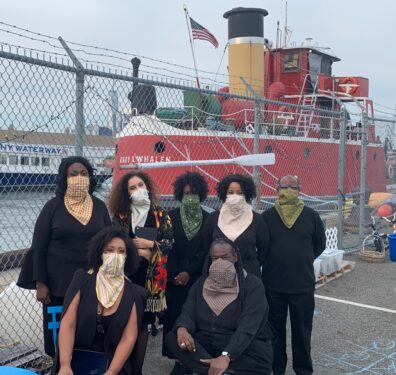
RED HOOK — On Oct. 10, three scenes from the new opera “This Little Light of Mine” were privately workshopped and filmed outdoors on the historic oil tanker Mary A. Whalen. The work, commissioned by the Santa Fe Opera, is part of the Opera for All Voices program and portrays key events in the life of voting rights activist Fannie Lou Hamer, who rose to national prominence at the 1964 Democratic National Convention. A black woman of humble origins, Hamer spoke truth to power, and her tireless efforts culminated in the passage of the Voting Rights Act of 1965.
Beth Greenberg, the opera’s stage director, directed a reading of the libretto in April of 2019 but said nothing came of it after that.
“Over the summer, I was thinking about Hamer’s voice again,” Greenberg told The Tablet. She thought it was important to make the opera a reality, even amidst a pandemic and before the 2020 presidential election.
A big question from the opera, according to Greenberg, is, “Can younger generations be inspired by Hamer’s example of courage through determined participation in American democracy?” Greenberg strongly believes so and hopes Hamer’s message and life will resonate with a broader audience, especially with the upcoming election in mind.
“Nothing — not even a pandemic — can stop the force of her truth, the lessons we still need to learn, and the need for our artistic souls to make collaborative music in remembrance,” she said. “We need her inspirational words and towering strength more than ever before.”
In the opera, adopted daughter Dorothy Jean Hamer tells how Fannie Lou and her husband “Pap” took in foster children as their own, how the injustices of the Jim Crow laws emboldened Fannie to demand the right to vote for African Americans, and how Fannie shook the political world during “Freedom Summer” by helping to found the Mississippi Freedom Democratic Party.
After registering to vote in 1963, Hamer and many other black women were arrested for sitting in a South Carolina “whites-only” bus station restaurant. While at the jailhouse, they were severely beaten. Hamer — a practicing Christian — spoke with the jailer’s wife and encouraged her to read the verses in Proverbs 26:26 and Acts 17:26.
Proverbs 26:26 reads, “A man may conceal hatred under dissimulation, but his malice will be revealed in the assembly.” Acts 17:26 reads, “He made from one the whole human race to dwell on the entire surface of the earth, and he fixed the ordered seasons and the boundaries of their regions.”
Later describing to the Convention Credentials Committee her story of harassment, arrest, and beating by the police, Hamer pointedly asked, “Is this America, the land of the free and the home of the brave, where we have to sleep with our telephones off the hooks because our lives are threatened daily, because we want to live as decent human beings, in America?”
Despite discrimination, harassment, and brutality, Hamer’s faith remained strong as she fought to ensure that African Americans had the right to vote.
“Her faith was integral to her strength, and I think it was evident to everyone who knew her how she drew from her faith,” librettist Diana Solomon-Glover told The Tablet. “It emboldened her to put her body in harm’s way, to bring about a change in Mississippi. It was everything to her.”
In the same vein, composer Chandler Carter added that Hamer never lost faith in doing the right thing and never lost faith in democracy in America.
“She kept going for years when people had forgotten about her and never stopped,” Carter said. “She should be an inspiration to all Americans because of the sacrifices she made, nearly giving up her life, in order to register to vote to make her life better and better for her community. I wish everybody knew her story, and this is just our contribution to making sure everyone knows who Fannie Lou Hammer is.”
This fall, the Santa Fe Opera will join other organizations in supporting the “Get Out the Vote” campaign through the national screening of “Is This America?” that’s based on the opera. The free screening and a follow-up panel discussion with the creative team will take place on Oct. 23 at 8 p.m. (ET). More information can be found on the Center for Contemporary Arts Santa Fe’s website.
